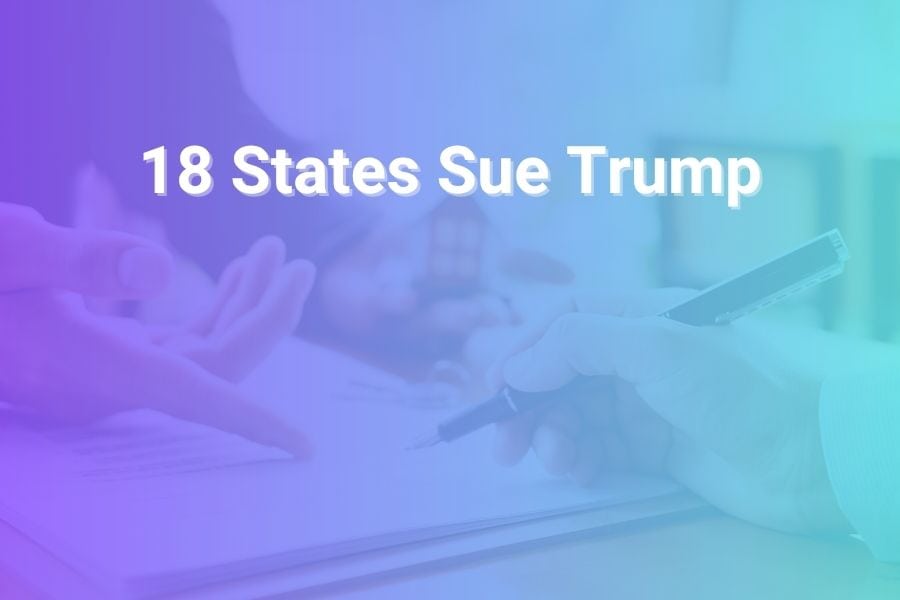
The political landscape of the United States has once again been shaken by a major legal confrontation involving former President Donald Trump. In early 2025, a coalition of 18 states filed a sweeping lawsuit against Trump, challenging his latest executive actions and policies they argue threaten constitutional principles and the rights of American citizens.
This unprecedented multi-state legal move reflects growing concern among state governments about the balance of power between Washington and the states. In this article, you’ll learn why these states are suing Trump, the legal grounds behind their case, how it affects the federal government, and what this battle could mean for American democracy in 2025.
Background of the Lawsuit
The case began when Trump, through a series of executive decisions and Treasury directives, attempted to enforce policies related to cryptocurrency regulation, birthright citizenship, and federal voting initiatives. Several Democratic-led states viewed these moves as an overreach of executive authority. They claimed the measures undermined constitutional safeguards and disrupted the autonomy of individual states.
Oregon Attorney General Ellen Rosenblum led the coalition, joined by California, New York, Illinois, Massachusetts, Washington, and others. The states filed the complaint in the U.S. District Court for the Northern District of California, a jurisdiction often at the forefront of federal challenges. The lawsuit contends that Trump’s directives violate the Tenth Amendment, which reserves powers not delegated to the federal government for the states and the people.
Central Issues in the Legal Challenge
The lawsuit focuses on three key issues that the states argue demonstrate Trump’s unlawful use of power:
-
The Birthright Citizenship Block:
Trump’s attempt to curtail birthright citizenship through executive order directly challenges the Fourteenth Amendment. The states argue that citizenship laws can only be changed by Congress, not through executive decree.
-
Cryptocurrency and Treasury Oversight:
Trump’s administration allegedly coordinated with Treasury officials to impose selective sanctions on states and businesses tied to cryptocurrency innovation. States claim this action unfairly targets local economies and violates the Commerce Clause.
-
Voter Access and Federal Oversight:
The coalition argues that Trump’s efforts to roll back voting accessibility initiatives—originally expanded by previous administrations—interfere with fair elections and state-run voting processes.
Each of these issues raises fundamental questions about separation of powers, state sovereignty, and constitutional rights.
Trump’s Response to the Lawsuit
Trump’s legal team responded swiftly, dismissing the lawsuit as politically motivated. They argued that the former president’s executive orders were within his authority under federal law and aimed to “restore constitutional order.” Trump’s spokesperson labeled the coalition’s lawsuit “another witch hunt,” drawing parallels to previous investigations during his presidency.
Behind the political theatrics, Trump’s team contends that his policies are intended to protect national interests—particularly around financial stability, border control, and election security. His advisers claim that states opposing these measures are prioritizing partisan gains over public safety.
Why the States Are Taking Action
For many of the states involved, the lawsuit represents more than just opposition to Trump’s policies—it’s a defense of federalism. State attorneys general have grown increasingly assertive in using litigation to check perceived federal overreach. Since 2017, multi-state lawsuits have become a common tool in the U.S. political system.
The 18 states argue that Trump’s actions undermine key democratic protections. They say blocking birthright citizenship, for instance, could render millions of children stateless. Similarly, intervening in cryptocurrency policy without congressional approval could destabilize state-level innovation and economic independence.
Moreover, states claim that limiting voting access initiatives violates the Voting Rights Act and could disproportionately affect minority and low-income voters. Their legal filing calls Trump’s actions “a calculated effort to erode democracy under the guise of reform.”
Historical Context and Constitutional Debate
Disputes between the federal government and states are as old as the republic itself. From the Civil War to the civil rights era, the tug-of-war over state and federal power has shaped American law. The Trump lawsuit fits squarely within this tradition—but its scope is unusually broad.
The Fourteenth Amendment, which guarantees birthright citizenship, has long been considered untouchable. Legal scholars widely agree that any attempt to change it would require a constitutional amendment, not an executive order. Meanwhile, the Tenth Amendment has served as a foundation for states’ rights arguments since the early 19th century.
By invoking both amendments, the 18-state lawsuit highlights the tension between federal control and state autonomy. In many ways, this lawsuit tests how far executive power can stretch in a deeply divided nation.
Public Reaction and Political Fallout
Public opinion on the lawsuit has been sharply divided along partisan lines. A 2025 Gallup poll found that 61% of Democrats support the states’ legal challenge, while 68% of Republicans view it as politically motivated. Independent voters appear split, with many expressing concern about the precedent the case could set.
The lawsuit has also reignited debates about Trump’s influence in American politics. Despite leaving the White House years ago, Trump continues to exert a strong grip over the Republican Party and its policy agenda. His recent involvement in cryptocurrency regulation and immigration reform has been seen by some as an attempt to position himself for another presidential run.
Political analysts suggest that if the lawsuit succeeds, it could limit future presidents’ ability to use executive power as aggressively as Trump did. However, if Trump prevails, the result could expand presidential authority significantly, reshaping the balance of power for decades.
Economic Implications of the Dispute
The economic stakes of the case are high. Trump’s executive actions, particularly those involving cryptocurrency and Treasury oversight, have already rattled markets. Several states—including New York and California—claim that new Treasury restrictions have disrupted blockchain startups and driven investors overseas.
In response, state officials have emphasized that innovation in decentralized finance is critical to maintaining American competitiveness. They argue that Trump’s policy punishes states that lead in tech-driven economies. Economists estimate that the uncertainty surrounding the lawsuit could cost billions in lost investment if not resolved quickly.
Meanwhile, the broader issue of birthright citizenship carries its own financial implications. Ending automatic citizenship could drastically affect healthcare, education, and social services, as millions of residents might lose eligibility for key programs. Analysts predict that states would bear much of the cost of managing the fallout, potentially straining budgets already stretched by inflation and housing crises.
The Legal Path Ahead
The case’s legal journey is expected to be long and complex. The coalition has requested an injunction to block Trump’s executive orders from taking effect while litigation proceeds. The Department of Justice, still adjusting to shifts in political leadership, has not yet taken a clear position, though some officials have signaled concern about executive overreach.
If the case moves to the Supreme Court—as many expect—it could set a precedent on executive authority not seen since the 1930s. Legal scholars compare it to landmark cases such as Youngstown Sheet & Tube Co. v. Sawyer (1952), which limited presidential power during emergencies.
The Supreme Court’s current conservative majority could make the outcome uncertain. Some justices may view Trump’s actions as legitimate exercises of executive discretion, while others could see them as violations of the Constitution’s separation of powers.
Implications for Future Presidents
Regardless of the final ruling, the lawsuit will shape how future presidents use executive authority. If the courts side with the states, presidents may face stricter judicial checks when issuing executive orders. Conversely, if Trump’s team wins, the ruling could embolden future leaders to bypass Congress more frequently.
This potential shift raises questions about accountability. Critics worry that allowing presidents to legislate through executive action undermines democratic oversight. Supporters argue that decisive action is necessary in an era of political gridlock.
State Unity and Bipartisan Concerns
Though led primarily by Democratic states, the lawsuit includes several moderate Republican attorneys general. This bipartisan involvement underscores growing unease about unchecked executive power—regardless of party.
Officials from states like Vermont and Maryland emphasized that their participation is not about partisanship but about preserving the constitutional framework. They stress that the issue goes beyond Trump himself, reflecting a broader need to restore balance between the branches of government.
Potential Outcomes and National Impact
There are several possible outcomes to this case:
- Federal Injunction: Courts could halt Trump’s executive orders pending further review.
- Dismissal: If judges determine the states lack standing, the case could be dismissed, though appeals would likely follow.
- Supreme Court Review: The case could escalate to the Supreme Court, leading to a landmark constitutional decision.
Each outcome carries major implications. An injunction would preserve existing protections for citizens and businesses while slowing Trump’s initiatives. A dismissal could embolden federal executives to expand their powers further. A Supreme Court decision could redefine the scope of presidential authority for decades.
What This Means for American Democracy
At its core, the lawsuit by 18 states against Trump reflects a deeper struggle over who defines the rules of American democracy. The courts now face the challenge of determining whether the Constitution limits executive authority enough to prevent potential abuses—or whether it allows presidents broad discretion in times of perceived national urgency.
For everyday Americans, the case highlights how state governments play a vital role in checking federal power. Whether through defending constitutional rights or safeguarding economic interests, states continue to act as laboratories of democracy and guardians of civil liberties.
In the coming months, all eyes will be on the courtroom as the legal arguments unfold. Whatever the outcome, the decision will shape not only the future of Trump’s policies but also the limits of presidential power in the United States.
